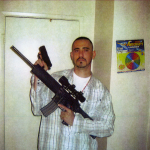THE BORDER REPORT
This story aired on KJZZ, public radio Arizona as part of the Fronteras Desk. For more stories, go to
FronterasDesk.org.
An accused Mexican drug lord being held on charges in the U.S. has filed a unusual motion in federal court. He's challenging the United States, saying he'd been working with its own federal agents in Mexico.
Jesus Vicente Zambada Niebla is one of the most senior drug trafficking figures in U.S. custody. He's accused of working for the Sinaloa Cartel, a powerful drug trafficking organization in Mexico. In fact, he's the eldest son of one of its leaders. Zambada was arrested in Mexico City in 2009 and extradited to Illinois, accused of trafficking nearly $6 billion in cocaine. He's contracted some of the highest profile criminal defense lawyers in the country.
In 2003, the United States indicted him in a massive anti-drug operation that stretched from Colombia to Mexico to Tucson, Los Angeles, Phoenix, New York, Virginia and Rhode Island. Nearly 250 people were arrested and it was among the first indictments filed against Zambada's father, Ismael "El Mayo" Zambada, now one of the leaders of the Sinaloa Cartel.
Last month his attorneys filed a simple but explosive one page motion in federal court. They say the FBI, the DEA and various Homeland Security agents in Mexico were actually working with Zambada for more than five years.
(Click to enlarge.)

Peter Henning is a law professor at Wayne State University Law School. He says the public authority assertion made by Zambada's legal team is nearly unheard of in organized crime cases.
"Essentially, this is the type of claim by a defendant that puts the government on trial; saying that the government sponsored illegal activity," Henning said.
Neither the Justice Department nor Zambada's lawyers would comment on the record for this story because of the sensitivity of the case.
But the motion names several DEA and FBI agents who have actively worked in Mexico, claiming they authorized Zambada's activities. One that was named, Eduardo Martinez, was the DEA's attaché in Hermosillo, Sonora, Mexico until 2008. His name frequently surfaced in federal court warrants as the investigating agent in cross-border trafficking cases.
"Given what's going on with the Mexican drug cartels, the last thing the United States can handle is any kind of finding that it in fact sponsored one of the drug cartels," Henning said.
A date has not been set for the Chicago trial. When that trial concludes, Zambada will stand trial in Washington for the Operation Trifecta case.








